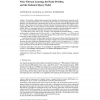Free Online Productivity Tools
i2Speak
i2Symbol
i2OCR
iTex2Img
iWeb2Print
iWeb2Shot
i2Type
iPdf2Split
iPdf2Merge
i2Bopomofo
i2Arabic
i2Style
i2Image
i2PDF
iLatex2Rtf
Sci2ools
109
click to vote
STOC
2000
ACM
2000
ACM
Noise-tolerant learning, the parity problem, and the statistical query model
We describe a slightly subexponential time algorithm for learning parity functions in the presence of random classification noise, a problem closely related to several cryptographic and coding problems. Our algorithm runs in polynomial time for the case of parity functions that depend on only the first O(log n log log n) bits of input, which provides the first known instance of an efficient noisetolerant algorithm for a concept class that is not learnable in the Statistical Query model of Kearns [1998]. Thus, we demonstrate that the set of problems learnable in the statistical query model is a strict subset of those problems learnable in the presence of noise in the PAC model. In coding-theory terms, what we give is a poly(n)-time algorithm for decoding linear k × n codes in the presence of random noise for the case of k = c log n log log n for some c > 0. (The case of k = O(log n) is trivial since one can just individually check each of the 2k possible messages and choose the ...
Related Content
| Added | 01 Aug 2010 |
| Updated | 01 Aug 2010 |
| Type | Conference |
| Year | 2000 |
| Where | STOC |
| Authors | Avrim Blum, Adam Kalai, Hal Wasserman |
Comments (0)

